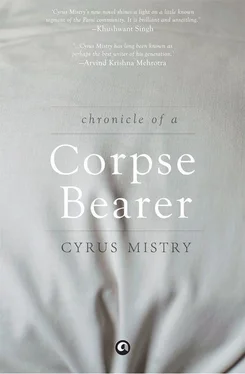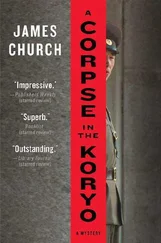We were the last customers still left in the restaurant; everyone else had left long ago. Two waiters hovered at a discreet distance, wondering how to tell us they were closing. But I suppose they must have sensed from Rohinton’s manner a handsome tip coming. My friend was in fact in no mood to wind up. He was so elated by the outcome of my meeting with my father, and the words I had reported to him, he ordered cognac. Then he started off about his life in London.
Of the flat he maintained there at a place called King’s Cross, and a woman called Lizbeth, who looked after it for him when he wasn’t there, and lived with him as his wife when he was, though they had never married. He said England was a wonderful place, but most of its people were small-hearted and racist. He told me of an ultra-nationalist group he was part of, some of them Indian, others Irish, who met every week, usually at his place in King’s Cross, to plan the overthrow of imperial rule in India.
‘Most of our group just don’t approve of Gandhi’s methods, they find them too soft. I wonder. . In fact, before I came to India this time — I’ll let you into a secret, but you must keep this to yourself,’ he said, lowering his voice to a whisper—‘a proposal was made to me: now just keep this to yourself. .’—Rohinton actually glanced around, to ensure that no one was listening, but all the other tables were unoccupied—‘that I help build a bomb at a secret location in Bombay. You know the new viceroy’s just been appointed? — the idea was to find someone to throw it at him during a visit he has planned to the Gateway of India, after his investiture in Delhi. When the question of a secret location in Bombay came up, I immediately thought of you, and the Towers of Silence. But let me tell you, I completely rejected the idea. I didn’t agree to do it.’
(When he told me this, I, too, immediately thought of the ‘grotto’ as an ideal place for building bombs!)
‘In principle, I found it impossible to agree with the idea of “a parting kick for the British”, or “a lesson to imperialists for all time to come”. I thought it rather foolish to endanger negotiations for independence with a terrorist act at such a late stage. Besides, after I arrived in Bombay, my dad apprised me of Joseph’s condition, which is how I approached you for a completely different and more meaningful purpose.’
Twice, a waiter drew near our table respectfully bowing, and said the restaurant and bar were closing now. But Rohinton wanted a last round of cognac for the both of us, which the waiter obliged us with. We knocked it back with gusto and finally made our way out of the restaurant.

We didn’t feel like going home right away, so we spent another half-hour sitting on a wooden bench on the pier, listening to the lapping of the waves, gazing at the stars in a cloudless sky.
‘Thank you, Phiroze, for a great evening,’ Rohinton said when he finally dropped me home at almost four in the morning. Both of us felt flushed with a mutual sense of warmth — our youthful bond had been revived, of that there was little doubt.
At Kemps Corner, before he turned into the gate of the Towers of Silence, we heard an itinerant hawker who was carrying a wooden tray of glasses containing something white and viscous on his head. In the stillness of the cold morning, he was calling in a sharp, high-pitched voice:
‘ Doodh na puff. .doodh na puff. . Jelleee . .’
‘ I should thank you, Rohinton,’ I replied. ‘After all, you paid what must have been a whopping bill at the Taj!’
‘ Aargh !’ he said, making his favourite deprecating grimace once more that evening, ‘Money’s no object. Did you have a good time, Phiroze?’
‘I had a great time.’
‘That’s what matters. All’s well that ends well, thanks to you. .’
‘Thanks a lot, Rohinton.’
He waved to me and drove away.
But, as we found out the following day, all wasn’t well, and wouldn’t end so well either. Neither of us had any inkling when we parted, that though one conspiracy, hatched in London — to blow up Mountbatten with a bomb constructed at the Towers of Silence — was quite rightly abandoned even before it could be further elaborated on, another conspiracy, amusingly paltry and low-down in intent, yet equally nasty, would be enacted at the very location before the next forty-eight hours had elapsed.
Two days after my evening with Rohinton at the Taj, Joseph Maloney Kanga passed away. His body arrived at Doongerwaadi late in the afternoon, in a private hearse requisitioned by Dr Billimoria’s Nursing Home.
Before it could be moved from the hospital stretcher onto our iron bier, a flurry of phone calls flew to and from Buchia to Coyaji and from Coyaji to other senior trustees of the Punchayet. Finally, it was decided by the higher-ups, (and Buchia was told to follow instructions precisely), that the body be accepted as usual on presentation of a death certificate from the presiding doctor, and normal procedures for a Zoroastrian funeral followed. However, as an additional if unusual precaution, Buchia was advised that after the body was ceremoniously placed on the floor of Wadiaji’s cottage, with an oil lamp at its head and a tray of sandalwood and afarghan at its feet, he should ensure that the door of the cottage was padlocked through the night, until mourners started arriving in the morning for the funeral.
Whoever issued these instructions hadn’t taken into account the fierce reaction of orthodoxy amongst the corpse bearers themselves — a contagion Buchia himself had caught in full-blown form rather early in his career. For nearly a month, debate on the issue had raged in the vernacular press, dividing Zoroastrians in the city. The more liberal, pro-reform sections, perhaps sensing how volatile and sensitive this matter was to the common people, adopted an ambivalent and particularly indecisive posture.
They argued that though Joseph could not strictly speaking be considered a Zoroastrian, and hence wasn’t entitled to avail of a funeral at the Towers of Silence, his case was a unique one, and any exception made for it needn’t become a binding precedent for all time; that his scholarly intimacy with the faith was akin to, if not equal to, the ritual significance of a navjote, which for circumstantial reasons he had been denied; moreover, as the son of a fully fledged and altruistic Zarthosti, Nariman Kanga, the trustees of the Parsi Punchayet were not violating any essential mandate of the authority invested in them by allowing his funeral to take place; and finally, that the valuable donation made by Nariman Kanga would go a long way towards benefiting the needy of the community (but which should not be interpreted under any circumstances as having biased the Punchayet’s decision).
The legalistic shilly-shallying of the reformist faction, both within the Punchayet and outside it, led to the orthodoxy’s vocal majority raising its campaign to a shrilly hysterical intensity. Their leaders were quoted in the press describing the proposal to minister funeral rites to Joseph as the ‘Great Betrayal’. Naturally, khandhias, nussesalars and priests, that is, all those in charge of physically handling the corpse and conducting obsequies for it, could not be expected to remain dispassionate at the centre of this great clamour. Myself, frankly, I felt quite indifferent to the whole hullabaloo; though mostly sorry for Joseph and his family. In the course of the afternoon, when instructed to do so by Buchia, I completed the washing of his corpse. That was the full extent of my arrested acquaintance with Joseph Kanga.
Читать дальше













